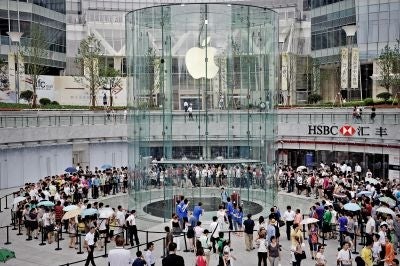Your support helps us to tell the story
From reproductive rights to climate change to Big Tech, The Independent is on the ground when the story is developing. Whether it's investigating the financials of Elon Musk's pro-Trump PAC or producing our latest documentary, 'The A Word', which shines a light on the American women fighting for reproductive rights, we know how important it is to parse out the facts from the messaging.
At such a critical moment in US history, we need reporters on the ground. Your donation allows us to keep sending journalists to speak to both sides of the story.
The Independent is trusted by Americans across the entire political spectrum. And unlike many other quality news outlets, we choose not to lock Americans out of our reporting and analysis with paywalls. We believe quality journalism should be available to everyone, paid for by those who can afford it.
Your support makes all the difference.Consumers in Shanghai are buying online and turning to the internet for advice about numerous types of purchases in a market where total retail sales in 2010 amounted to $34 billion, just for the Chinese city alone.
China's online population, estimated at 457 million - more than the entire population of the United States, is growing at a rate of 19 percent per year. This growing online population and the rise in online shopping sites could lead China's consumers to bypass traditional "brick and mortar" retail outlets and complete most of their purchases online, according to the results of a year-long survey released February 17 by market research and consulting company DDMA.
The correlation between the areas with the highest internet penetration and the areas with the highest household consumer product consumption (Beijing, Shanghai, Guangdong, Tianjin, Zhejiang and Fujian) testifies to the rising popularity of internet shopping.
Conducted among residents of Shanghai throughout 2010, the survey by DDMA found that 10 percent of all retail sales were conducted online largely through sites such as market leader Taobao, whose sales revenue in 2010 was the equivalent of 2.5 percent of all retail sales throughout the entire country.
The most important factor in completing purchases for 34 percent of the Chinese shoppers was online information about the product or services. For example, according to the survey, total retail sales generated at the box office in Shanghai amounted to $121 million, of which $67 million can be attributed to sales influenced by online information - pop-ups, reviews and trailers - rather than billboards for instance.
To put these figures in perspective, in 2010, UK total online sales grew 16 percent to $70.95 billion (£44 billion), the highest overall online spend in Europe according to a January report by price comparison site Kelkoo and the Center for Retail Research.
According to DDMA, the top ten categories according to total retail spending linked to or influenced by online information in 2010 in Shanghai were:
01. Shanghai Outbound Travel and Tourism: $8.9 billion
02. Restaurants, Bars, KTVs (karaoke bars ) and Nightclubs: $3.2 billion
03. Medium to High-end Branded Apparel: $1.97 billion
04. (joint 4/5 ) 3G and Smartphones: $1.8 billion
05. (joint 4/5 ) Home Appliances: $1.8 billion
06. Passenger Cars: $1.3 billion
07. Cosmetics and Skincare: $830 million
08. Furniture, home textiles, table ware and home decoration materials: $442 million
09. Home Computers: $262 million
10. Digital Cameras and MP3/MP4 players: $227 million

Join our commenting forum
Join thought-provoking conversations, follow other Independent readers and see their replies
Comments